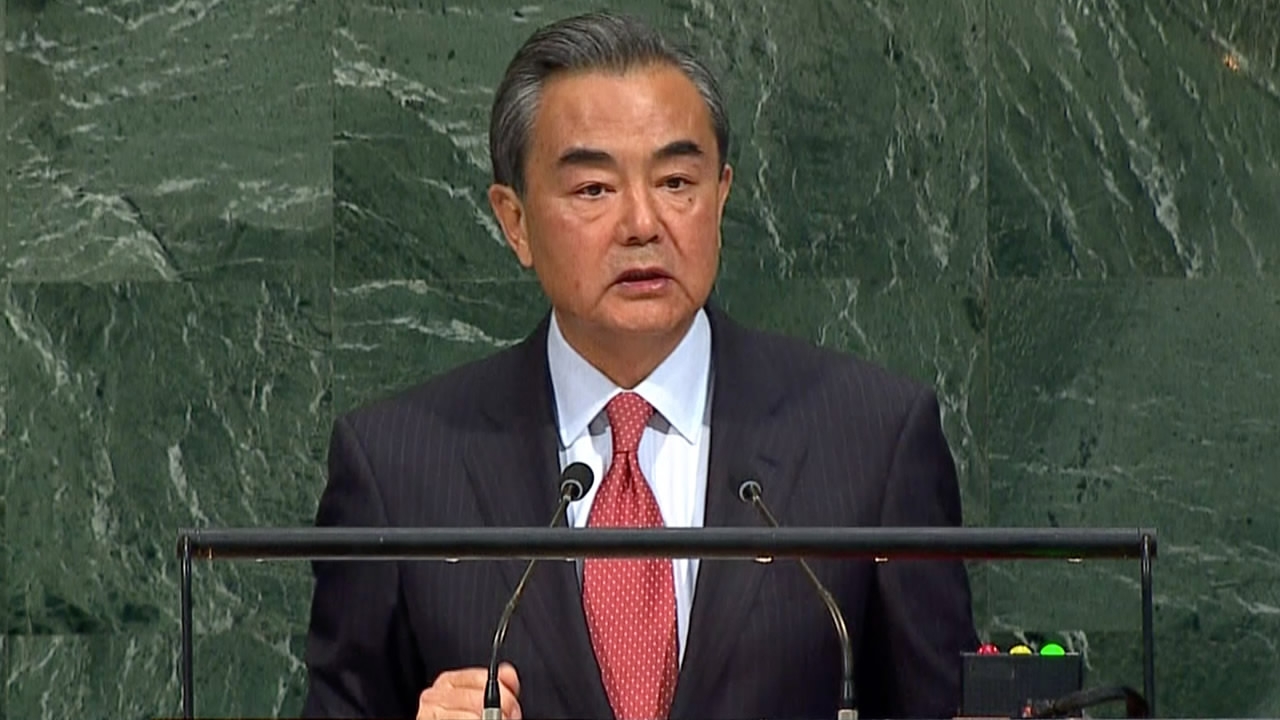The 72nd UN General Assembly's general debate ended on Monday, with concerns over the Korean Peninsula issue, the Iranian nuclear deal and other major international and regional issues dominated the discussion.
Chinese Foreign Minister Wang Yi headed a delegation to attend the General Debate, which kicked off on September 19. During the debate, he gave a full account of China's stances and propositions on the current major international and regional issues, as well as reiterated China's firm resolve to uphold world peace and stability and promote development and prosperity.
The DPRK issue
During the week-long General Debate at UNGA, the Korean Peninsula tension continuously escalated because of the ongoing war of words between the US and the DPRK. Wang Yi in his speech told the world leaders that there is still hope for peace and urged for caution and diplomacy.
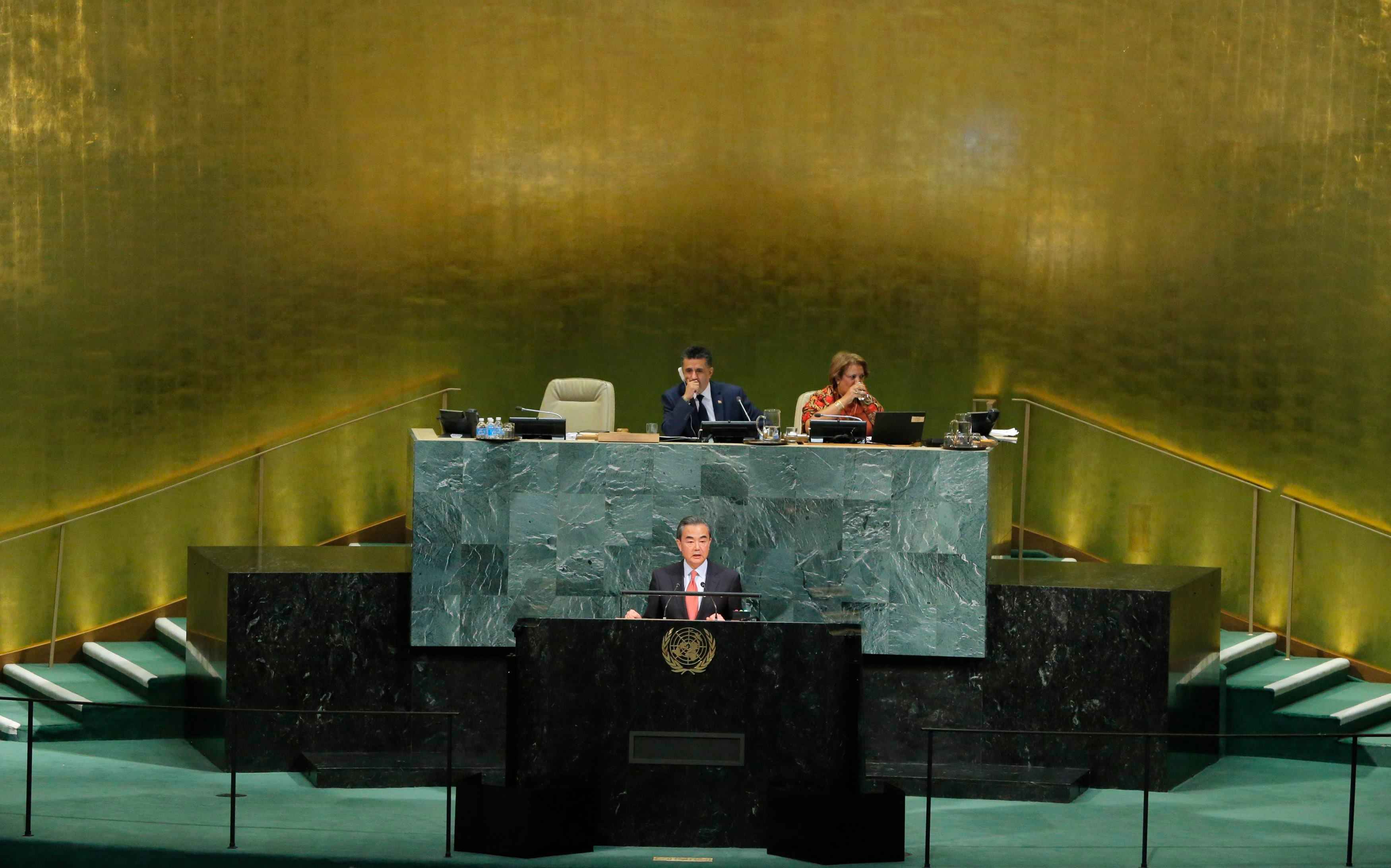
Chinese Foreign Minister Wang Yi addresses the 72nd United Nations General Assembly at UN headquarters in New York, US, September 21, 2017. /Reuters Photo
Chinese Foreign Minister Wang Yi addresses the 72nd United Nations General Assembly at UN headquarters in New York, US, September 21, 2017. /Reuters Photo
"Negotiation is the only way out and deserves every effort. Parties should meet each other halfway by addressing each other’s legitimate concerns,” he added that China has tirelessly sought peace on the Korean Peninsula, and would stay firmly committed to its denuclearization.
Underlining China's tireless efforts to maintain peace on the Korean Peninsula, he also urged the DPRK not to go further along its dangerous direction, while calling on the United States to honor its commitments in the region.
During a meeting with ROK’s Foreign Minister Kang Kyung-wha, Wang Yi pointed out that the UN Security Council resolutions concerning the DPRK not only stipulate the imposition of sanctions, call for the resumption of negotiations but also stressed the need to find a peaceful resolution to the issue.
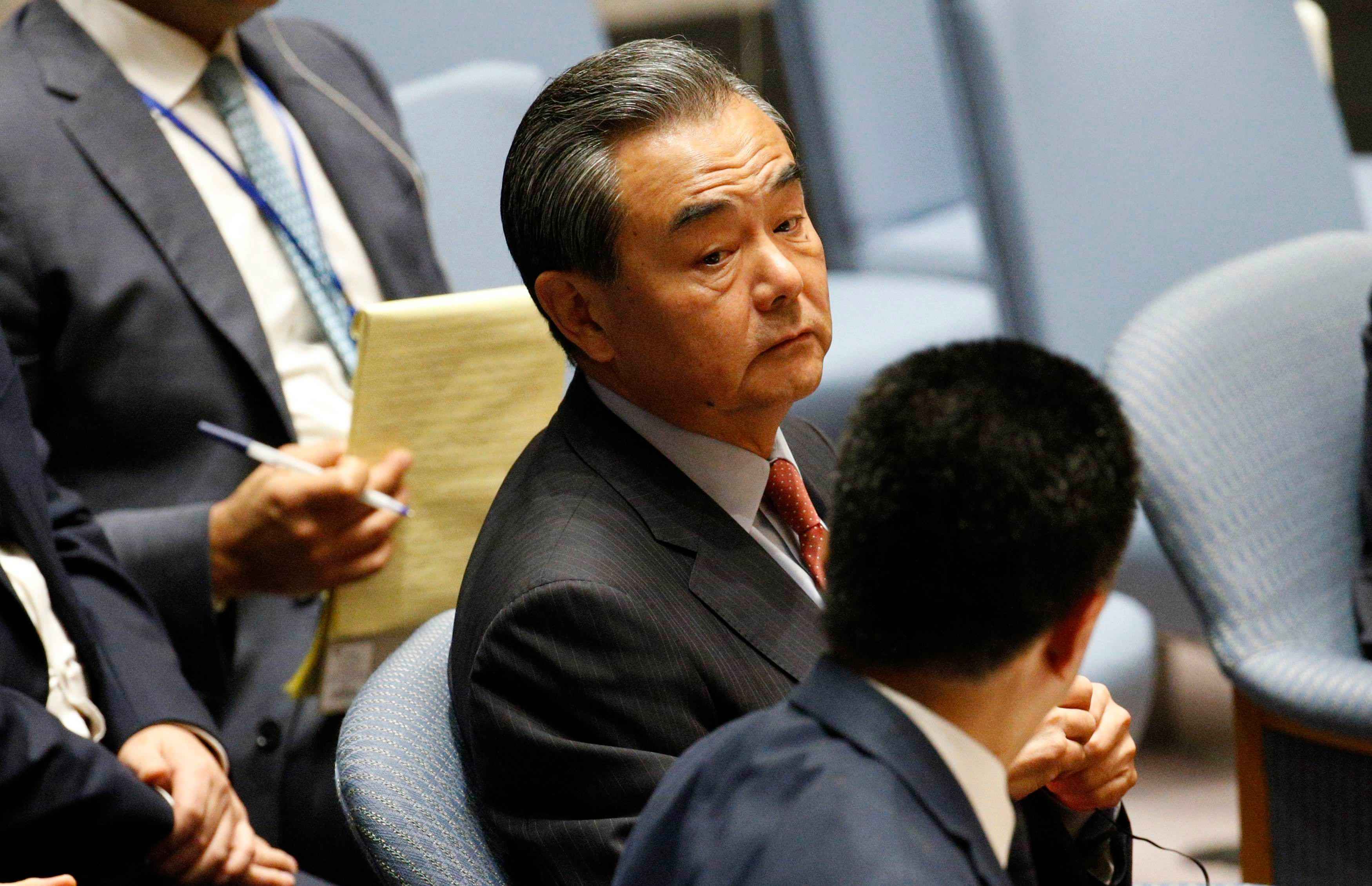
Chinese Foreign Minister Wang Yi finishes speaking during a UN Security Council meeting to discuss the acute threat posed by the proliferation of weapons of mass destruction, on the sideline of the 72nd United Nations General Assembly at UN Headquarters in New York, US, September 21, 2017. /Reuters Photo
Chinese Foreign Minister Wang Yi finishes speaking during a UN Security Council meeting to discuss the acute threat posed by the proliferation of weapons of mass destruction, on the sideline of the 72nd United Nations General Assembly at UN Headquarters in New York, US, September 21, 2017. /Reuters Photo
The minister reiterated China’s stance to implement the UN resolutions strictly and expressed China’s determination on the denuclearization of the Korean Peninsula.
"China will hold the target to the end no matter how long it takes or how difficult it is to attain,” Wang said.
Iranian Nuclear deal
The 2015 Iranian nuclear deal is likely to collapse after the US President Donald Trump repeated threats to withdraw from the deal. Trump during his debut address at UNGA on September 19 also said the deal was one of the worst and most one-sided transactions in international relations, and "an embarrassment" to the United States.
Upholding China's support for Iran's nuclear deal, Wang reiterated on the essential role of the nuclear deal in the international non-proliferation regime and in maintaining peace and stability in the Middle East, urging all parties to look at the positive side of the deal as no agreement is perfect.
Wang further said that the tensions on the Korean Peninsula underlined the importance of the Iranian nuclear deal, calling all parties should fulfill their obligations to ensure effective implementation of the agreement.
Other main issues
Ahead of the general debate which kicked off on September 19, the UNGA adopted a resolution which incorporates the principle of "extensive consultation, joint contribution and shared benefits" put forward by China.
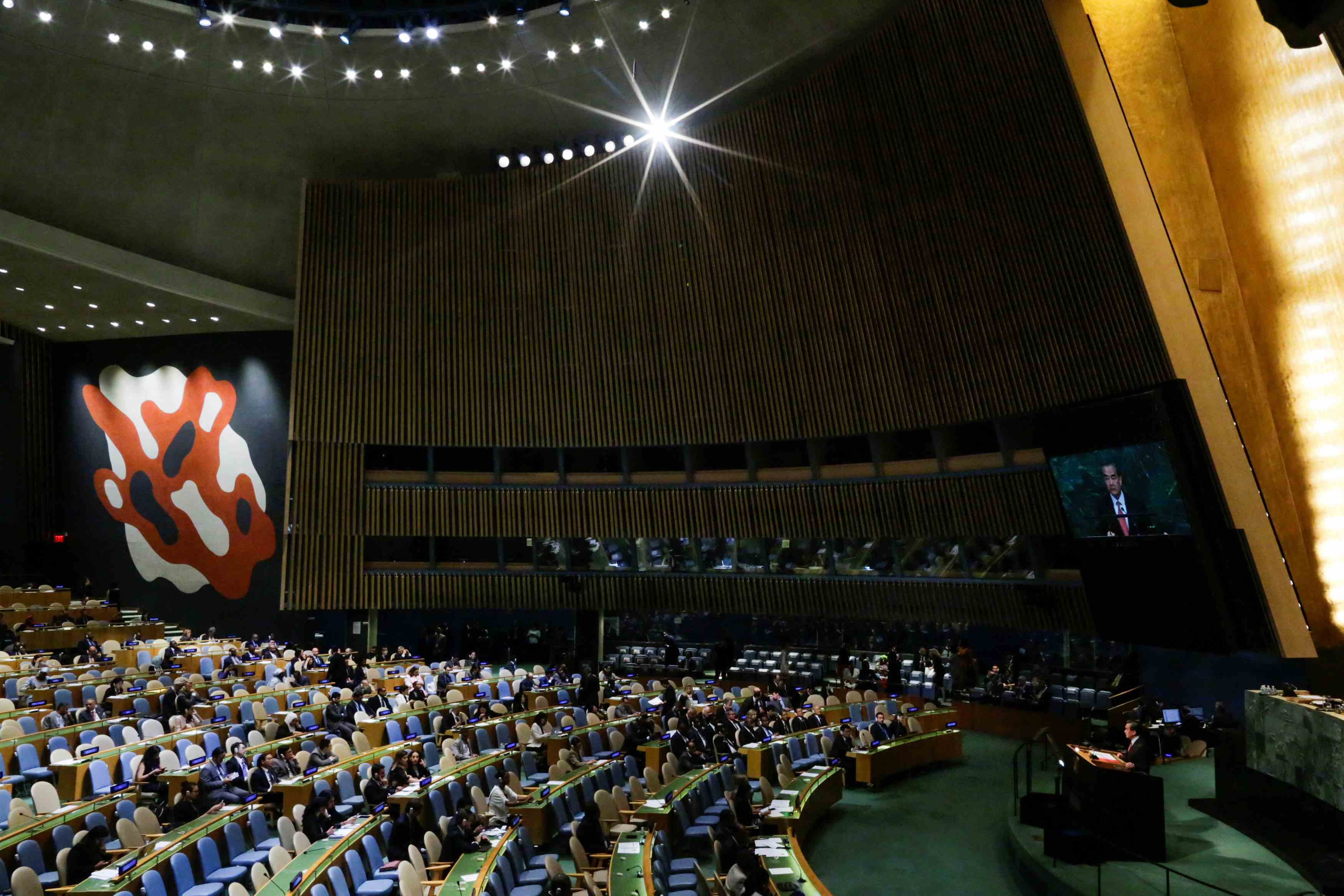
Chinese Foreign Minister Wang Yi addresses the 72nd United Nations General Assembly at the UN headquarters in New York, US, September 21, 2017. /Reuters Photo
Chinese Foreign Minister Wang Yi addresses the 72nd United Nations General Assembly at the UN headquarters in New York, US, September 21, 2017. /Reuters Photo
Facing a sluggish international economy and changes in the global landscape, China, with other emerging economies, e.g., BRICS countries, have increasingly played a greater role in global governance.
Wang expressed China's support for UN reform when meeting with President of the 72nd Session of the UN General Assembly Miroslav Lajcak on September 18, adding that China hopes reform will be carried forward in a stable manner with respect for the opinions of member states.
As the world is facing unprecedented, interconnected environmental challenges, Wang Yi at the UNGA expressed China’s willingness to actively participate in global environmental governance, firmly support and implement the Paris Agreement, and contribute its share to advance a fair and reasonable, win-win cooperative multilateral system of international environmental governance.
"China attaches great importance to sustainable development, upholds the development concept of innovation, coordination, green, open and shared benefits, and has already included ecological civilization construction into national development strategy. “ Wang clearly expounded China’s position on environmental issues.
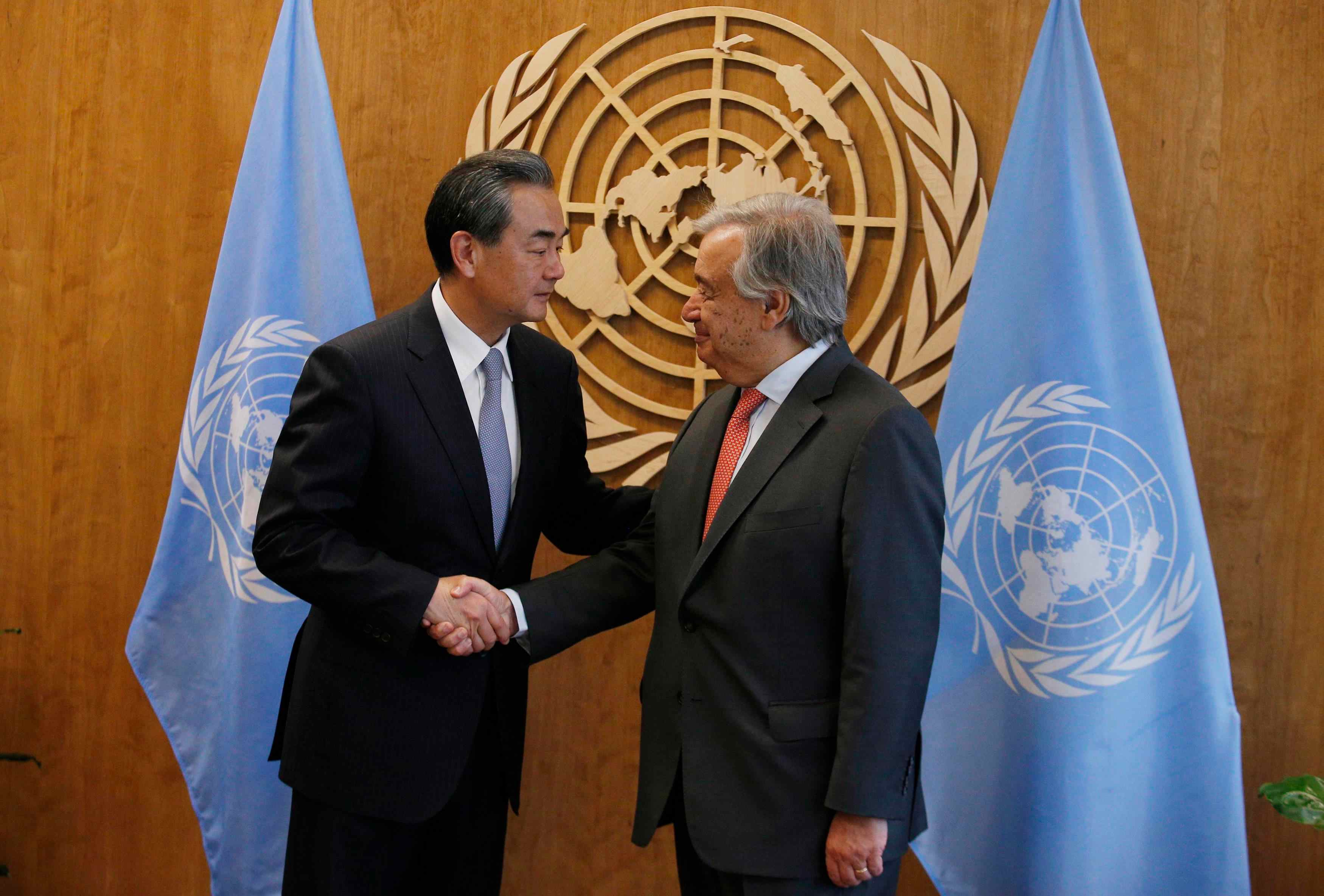
Chinese Foreign Minister Wang Yi (L) shakes hands with United Nations Secretary General Antonio Guterres prior to their meeting at UN headquarters in New York, US, September 18, 2017. /Reuters Photo
Chinese Foreign Minister Wang Yi (L) shakes hands with United Nations Secretary General Antonio Guterres prior to their meeting at UN headquarters in New York, US, September 18, 2017. /Reuters Photo
The crisis in the Rakhine State of Myanmar has drawn international attention as more than 410,000 Rohingya Muslims fleeing to neighboring Bangladesh.
Addressing the crisis, Wang said during a meeting with UN Secretary-General Antonio Guterres that China understands and supports Myanmar's efforts to protect its security and will push for talks to solve the crisis in the country's Rakhine State.
Wang also expressed sympathy for Rohingya refugees fleeing to Bangladesh and said China would provide humanitarian aid to Bangladesh.
Concerning Syrian conflict, Wang called for a political solution when he met with Syrian Foreign Minister Walid Muallem. He hoped that the Syrian government and various factions could accelerate the process of political settlement under the auspices of the United Nations and work for the early restoration of stability.

